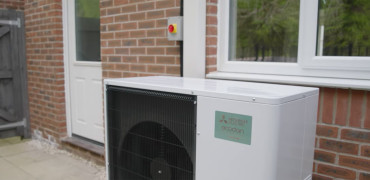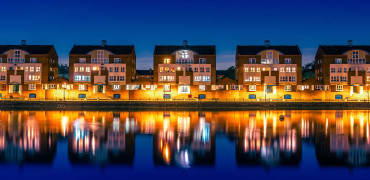I spent last Wednesday in a broadcasting studio in Central London with TV’s George Clarke who was being beamed into radio stations up and down the country for interviews in places as far apart as Edinburgh, Essex, Yorkshire, Norfolk, Birmingham, London, the South and even across the water to Northern Ireland.
It’s always a fascinating experience to listen to a consummate professional talk with ease about a subject they are passionate about, and this one goes right to the heart of what George believes in – and why he is an Ecodan Ambassador.
We were launching our second Annual Heat Pump Report, called ‘Heat Pumps – Accelerating the switch’, which looks at the barriers to adoption, and the opportunities that can be realised by increasing the rate that heat pumps are installed in UK homes and commercial buildings.
There’s already been a lovely example of the radio coverage with this recording of the interview between George and Aston Avery from Gateway 97.8FM.
None of the gas boilers sold from today will help us to reduce carbon emissions
Electricity prices
Our Report surveyed UK homeowners to reveal that a third of them would consider switching to a heat pump if there was more parity in electricity and gas pricing.
Many people don’t realise that there are higher levies on electricity prices than there are on gas, despite a heat pump being three times more efficient than a gas boiler.
The report also reveals that higher electricity prices correlate with fewer heat pump installations, indicating a 9% increase in heat pump installations each year if energy costs were rebalanced – a significant contribution towards achieving net zero emissions by 2050.
Around 80% of homeowners say they care about climate change but so far, only 6% have made the switch from gas boilers to low-carbon heat pumps. This year should see heat pump installations break through the 100,000 mark, but that is still nothing compared to the 1.5 million gas boilers sold each year.
It’s worth remembering that none of those gas boilers will help us to reduce carbon emissions (unless they are never switched on), and they will need to be upgraded at some point in the next 5 to 10 years if we are ever to get anywhere near our legally-binding, net zero targets.
Taking a look at businesses
Importantly, the report looks beyond housing and focuses on the commercial sector as well, which is sometimes overlooked in our net zero journey.
Yet using the government’s own data shows that in 2012, commercial buildings used 165 terawatt hours of gas per year, and over a decade later in 2023, this has only dropped 8% to 152 TWh.
So, there is a lot of gas still being burnt by businesses and, as George kept saying in the radio interviews, “we have to stop burning stuff”.
This therefore presents a huge opportunity for commercial heat pump manufacturers to help hard-pressed businesses switch from gas to reduce their running costs and carbon footprints.
Commercial example
We focused on three case studies in the Report to show how straightforward it can be to switch from carbon-intensive gas to sustainable heat pumps.
The commercial example focused on Building No.8 at Manchester’s Exchange Quay complex, which saw a 10-storey office block switch from gas boilers to heat pumps, with minimal disruption to occupants and an improvement from a ‘D’ rating of Energy Performance Certificate (EPC) to a ‘B’.
Bringing the message home
The other two case studies looked at residential properties with one focusing on social housing and how Sovereign Network Group is helping its customers with warmer, greener, more sustainable homes.
Interestingly the case study shows how a high temperature heat pump can be fitted in as little as two days to bring down installation costs and allow for the reuse of existing pipes and radiators, even when they are small or microbore.
The other case study highlights a couple that George met on our stand at the Ideal Home Exhibition. Once they had explored all the options available to them and applied for the £7,500 ‘free cash’ from the Boiler Upgrade Scheme, they opted for an Ecodan heat pump.
The final thing that George was keen to stress on the day, is that every house and commercial building is different, but the examples shown and the whole report highlights just how ready the technology is, how ready heating installers are, but how higher electricity pricing is holding the nation back from realising a huge saving in carbon emissions on our road to net zero.
Achilleas Georgiou is Communications Manager




